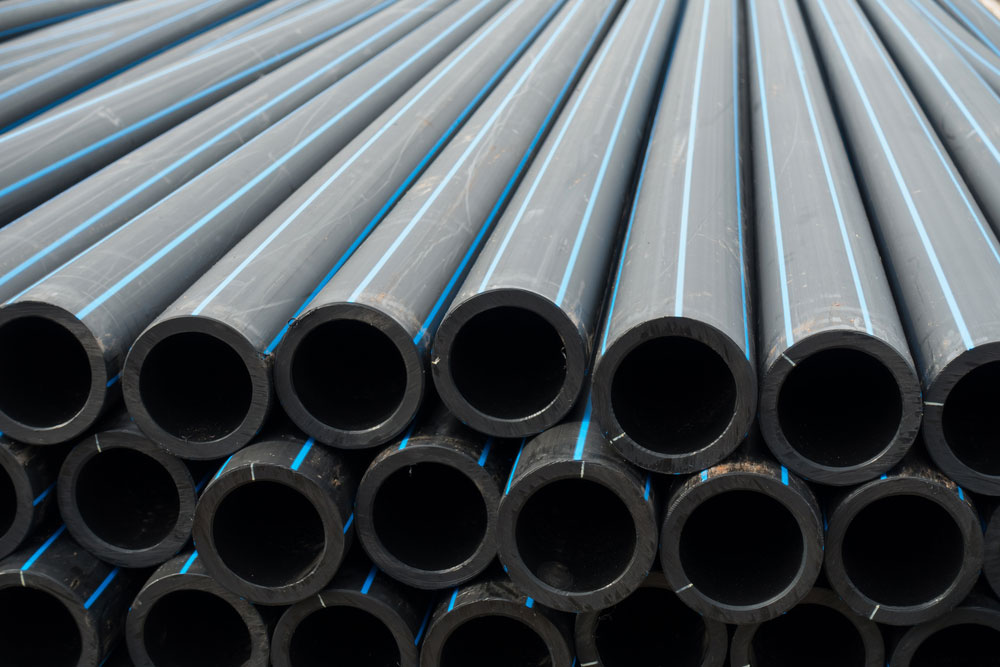Comprehending the Key Perks of HDPE Pipeline for Water and Wastewater Monitoring
The use of HDPE pipe in water and wastewater monitoring offers numerous advantages that merit consideration. Its phenomenal longevity and lengthy life-span make it a favored option for lots of tasks. Additionally, the product's resistance to deterioration and chemical damages boosts its integrity in various environments. The benefits prolong past simply long life and resistance. Pipe Supplier American Plastics Midland. Exploring its cost-effectiveness and environmental impact exposes a lot more compelling factors for its extensive adoption in modern-day facilities
Extraordinary Toughness and Longevity

HDPE pipeline stands apart for its exceptional sturdiness and long life, making it a favored selection in water monitoring systems. Constructed from high-density polyethylene, these pipes can hold up against significant stress and anxiety, making sure reliable efficiency gradually. Their durable nature permits them to sustain severe environmental problems, including temperature level variations and dirt activities, which can trigger other materials to fall short.
The life-span of HDPE pipelines frequently exceeds half a century, giving an economical remedy for districts and industries alike. Additionally, the material's lightweight buildings streamline installation, decreasing labor costs and timeframes. This longevity decreases the requirement for constant repair services or substitutes, additionally enhancing its financial appeal.
In water monitoring applications, the dependability of HDPE pipes indicates fewer disruptions and improved solution continuity, making them essential to sustainable infrastructure advancement. The combination of sturdiness and longevity solidifies HDPE's role as a foundation in efficient water monitoring services.

Resistance to Corrosion and Chemical Damage
While several products give in to corrosion and chemical damages over time, HDPE pipelines display exceptional resistance, making them excellent for different water administration applications. This resilience comes from the molecular structure of high-density polyethylene, which is naturally non-reactive and does not corrode like metals or weaken from direct exposure to harsh chemicals. As an outcome, HDPE is very efficient in settings with aggressive compounds, such as wastewater systems that might contain acids, bases, and natural solvents.
Additionally, HDPE pipes can endure environmental variables such as dirt level of acidity and saline problems, even more improving their suitability for varied applications (custom hdpe pipe manufacturing Midland TX). Their ability to maintain structural stability gradually minimizes the threat of leakages and failings, which is important in making certain the security and reliability of water distribution and wastewater monitoring systems. Consequently, the resistance to corrosion and chemical damages markedly contributes to the general effectiveness and longevity of HDPE piping solutions
Cost-Effectiveness and Financial Advantages
When taking into consideration the economic implications of water administration systems, the cost-effectiveness of HDPE pipelines comes to be obvious. These pipes provide lower installation and maintenance prices contrasted to traditional products like metal or concrete. Their light-weight nature simplifies transportation and installation, leading to decreased labor expenses. In addition, HDPE pipes show a long life expectancy, typically exceeding half a century, which converts to less replacements and long-lasting savings.
The resistance of HDPE to corrosion and chemical damages minimizes the demand for pricey fixings and substitutes. The pipes also support reliable he has a good point water flow, lowering power prices related to pumping systems. By mitigating leakages and water browse this site loss, HDPE pipelines add to substantial economic benefits for municipalities and sectors alike. On the whole, the initial financial investment in HDPE piping can produce considerable financial returns over the lifespan of the water administration system, making it a prudent choice for lasting facilities development.
Ecological Sustainability and Decreased Influence

Convenience and Flexibility in Installment
Due to their distinct properties, HDPE pipes provide exceptional adaptability and flexibility in setup, making them suitable for a variety of applications. Their light-weight nature enables much easier handling and transportation, decreasing labor prices and installation time. HDPE pipes can be bent and formed to fit different terrains and project requirements, which is particularly valuable in challenging atmospheres.
Furthermore, their resistance to deterioration and chemical damages allows for installation in varied setups without the requirement for specialized protective finishings. The ability to fuse joints produces a continuous, leak-free system, enhancing cast iron pipe the total stability and reliability of the installation. HDPE's adaptability additionally suits ground activity, reducing the threat of damages in areas prone to moving soil. In general, these qualities make HDPE pipes not only flexible but additionally a recommended option for water and wastewater management systems.
Often Asked Inquiries
Exactly How Does HDPE Pipe Contrast to PVC in Water Management Applications?
HDPE pipe supplies remarkable adaptability, resistance to rust, and resilience contrasted to PVC. Its lighter weight facilitates much easier setup, while its lengthy life-span decreases substitute costs, making HDPE a favored choice in water monitoring applications.
What Is the Life Expectancy of HDPE Pipes Under Common Problems?
Under common conditions, HDPE pipes can have a lifespan varying from 50 to 100 years. Their durability and resistance to corrosion add to their long-term performance in various applications, making them a trusted option for framework.
Are HDPE Piping Recyclable After Their Solution Life?
Yes, HDPE pipelines are recyclable after their solution life. hdpe pipe suppliers Midland TX. They can be processed and repurposed into new products, significantly reducing environmental effect and promoting sustainability within the market, making them an environmentally friendly choice for piping options
What Is the Setup Process for HDPE Pipeline?
The installment process for HDPE pipes entails website preparation, trenching, pipeline blend or mechanical signing up with, backfilling, and pressure screening. Correct methods guarantee a sturdy and reliable system for moving water and wastewater successfully.
Can HDPE Pipeline Be Utilized for Both Safe And Clean and Non-Potable Water Solutions?
Yes, HDPE pipes can be used for both safe and clean and non-potable water systems. Their adaptability, sturdiness, and resistance to deterioration make them appropriate for various applications, guaranteeing safe and reliable transportation of water in various contexts.